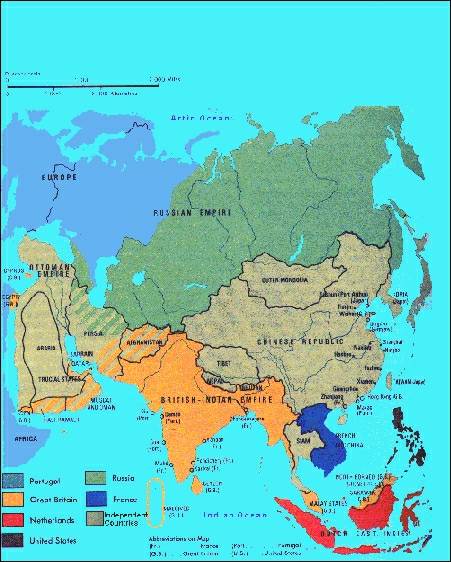|
PinkMonkey Online Study Guide-World History
10.5 Imperialism in Asia
The British, the French, the Dutch, the Portuguese
and the Germans, also attempted to extend their imperialist rivalries
into Asia.
1. British Imperialism
The foundation of the British Empire in India,
was laid by Robert Clive by winning the Battle of
Plassey in 1757. Thereafter Warren Hastings and Lord Wellesley
forced most of the Indian rulers to submission. Finally Lord
Dalhousie, by his Policy of Lapse, annexed much of the
territories of the Indian princes. This completed the work of the
British conquest of India by 1856. After the Sepoy Mutiny of 1857,
British India was transferred from the hands of the East India Company,
to those of the British Crown.
In the 1880ís Great Britain added Burma on the
east and Baluchistan on the west. In southern Asia, she secured
Singapore and Mallacce with the Federated Malay States. A third
of the island of Borneo was also appropriated. In southwestern Asia,
Great Britain obtained a series of protectorates form Aden to Kuwait.
They had a sphere of influence in southern Persia. Great Britain
secured Hong Kong from China. After 1898, a privileged position
was obtained in Tibet and the Yangtze Valley.
2. French Imperialism in Asia
In 1850, Napoleon III of France secured a part
of Anam. The French added Cambodia in 1864, Kochin-China in 1867,
Tonkin in 1873 and later the whole of Anam. All these regions were
united to make French Indo-China. In India, France held Chandranagar,
Yonaan, Pondicherry, Karikal and Mahe. In 1899, France leased Kungchow
form China. It secured a privileged position in the Chinese provinces
of Kwangsi and Hainan.
3. Dutch Imperialism in Asia
In Asia, the Dutch established the Dutch East Indian
Empire. The Empire was greatly extended by the conquest of the islands
of Sumatra, Java, Celebes, part of Borneo and half of New Guinea.
4. Portuguese Imperialism in Asia
The Portuguese had comparatively a small empire
in Asia, consisting of a few trading ports in India, the port of
Macao in China and half of the east Indian islands of Timor.
5. German Imperialism in Asia
Germany had acquired the northeastern part of New
Guinea in the 1880ís and renamed it Kaiser Wilhelmsland, and in
1898 leased from China, a part of Kiochow.
6. Russian Imperialism in Asia
Russia held Siberia and after 1850, it pushed its
frontier through Turkestan and other areas of west central Asia
to the borders of India, Afghanistan and Persia. It also, secured
a sphere of influence in northern Persia in 1907.

Exhibit 10.2
European colonies in Asia
Click here to enlarge
[
next page]
|